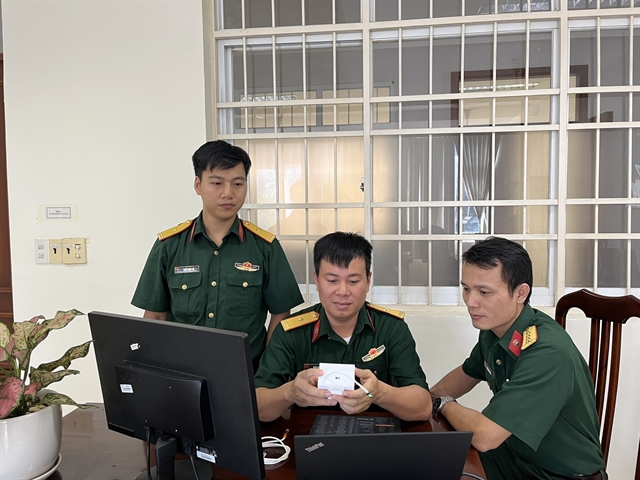 Society
Society

 |
| Major Thiều Hữu Cường (centre) holds the device to warns people of the risk of strokes.— VNA/VNS Photo |
KHÁNH HÒA — Major Thiều Hữu Cường, 37, a lecturer of the Telecommunications University in the coastal central province of Khánh Hòa, and his colleagues have successfully created a device that warns people of the risk of strokes.
The device, which applied the Internet of things (IoT), won third prize at the Information and Communications Corps’ Creative Youth Contest and will take part in the Creative Youth Award of the Ministry of National Defence.
The device is small, weighs about 200 grammes and is the size of a computer mouse. It includes an Arduino circuit with heart rate sensor, acceleration sensor, warning signal transceiver and general packet radio service (GPRS) tracker.
The device also has a speaker and battery. The device's battery is of a type that can be charged many times, helping users save maximum costs. The components to make the device are all available on the market and easy to buy.
The operating principle is based on parametres (heart rate, tilt, and impacts when people falling) that change according to programmed levels.
A central processor will analyse the features and produce prediction results. The results will be notified to the user and their family members by emitting sound from the device's speaker and setting up an automatic call and sending a message with content classifying the possibility of stroke in order to help their relatives know the location of people at risk of stroke.
Users only need to install a regular phone SIM card in the device. The costs to send automatic call and message are calculated according to the telecommunication provider.
The warning message will be sent to all family members via an application that the team has developed, Cường said.
“The application will be gradually equipped with multiple languages in the near future," he added.
According to the research team, there are many different types of stroke-warning products on the market, mainly aimed at measuring heart rate so that users can self-identify and then make appropriate adjustments.
The team’s product not only has the function of measuring heart rate but also alerts family members through the automatic call and message and on the application that the group created.
The product is completely mastered by the research team in terms of technology and production. If the product is brought to market, the price will be around VNĐ1 million (US$41) each.
It is currently in the testing phase to complete the medical device criteria.
Motivation
Cường was a student at the university before working as a lecturer of the university. During 15 years of working at the university, he has conducted many scientific research topics.
But the device warning about the risk of stroke for people is his first scientific topic with practical application.
He said he saw many cases of sudden strokes and they could not survive because they did not receive timely emergency treatment.
“It has motivated me and my colleagues to research and create a device to warn people, especially the elderly, about strokes” he said.
Strokes often has showed signs before they occur such as loss of self-control, loss of balance leading to falling or sudden changes in heart rate.
From initial research, he analysed the falling status and heart rate changes of stroked people to create an IoT device that warned about the risk of stroke, he said.
He and his colleagues diligently researched to make the device for more than a year with many trials and countless failures.
“Even though we failed many times, we are not discouraged, because our wish is to create a helpful product to warn about the risk of stroke for people,” he said.
He said scientific research was not only a professional task but also an opportunity to improve his capacity.
He can also teach his students more effectively, encouraging them to try to do scientific research and make highly applicable products.
Cường has received Certificates of Merit from all levels for his achievements in professional work.
Colonel Nguyễn Danh Khoa, vice principal of the university said scientific research and making highly applicable products were the target of the school. The device made by Cường and his colleagues had successfully fulfilled the target.
The device was evaluated as a highly applicable product when stroke had become one of the concerns of the elderly and people with underlying diseases, he said.
The product would be very competitive if it was brought to the market with the reasonable cost, he said.— VNS




